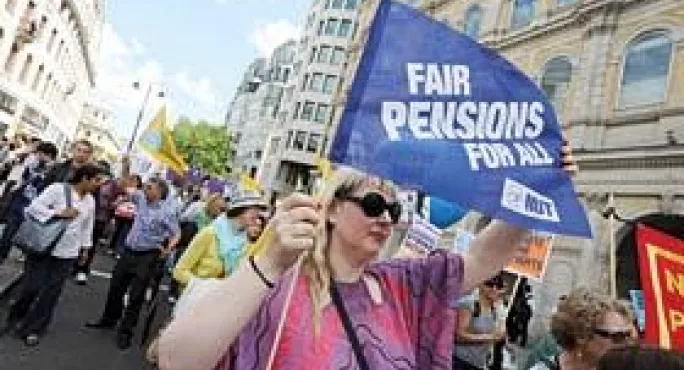A bubble of optimism, but fizz stays on ice

After months of fruitless talks between government officials and the education unions over planned changes to teachers’ pensions, the improved offer tabled last week seems to have kickstarted the negotiation process.
The concessions made by ministers address some of the general secretaries’ concerns: teachers due to retire in the next 10 years will be protected from the changes, while plans to cut the rate at which all teachers’ pensions increase in value have been abandoned. But there is a consensus among unions that the Government must go further if it is to come up with an acceptable offer. Indeed, on Wednesday heads’ union the NAHT said a majority of its members had backed its plans to strike on 30 November.
While Monday’s meeting between union leaders failed to yield a resolution, TES understands the unions are in broad agreement about what changes are still needed: teachers should be able to retire earlier and contribute less. They will demand a new deal that uncouples teachers’ retirement age from the state pension age. At present, the Treasury plans to link the two, meaning teachers due to retire after 2044 would have to work until they are 68 before they could hang up their whiteboard wipers.
Given what they argue are extreme physical demands on teachers, the unions say many will not be able to last that long.
“Retirement age is a key issue,” Association of School and College Leaders general secretary Brian Lightman said. “People are very concerned about having to work until 68.”
Linking teachers’ careers to the state pension age has been greeted with “huge resistance” from general secretaries, a union source said. “Teachers don’t want to work to 68, and there’s no guarantee that in 10 years they would not raise it to 69 or 70. The retirement age has got to be more appropriate for teachers, not local government workers.” But TES understands that Department for Education officials have been told by the Treasury that the link with the state pension age is untouchable.
The news in January that contributions would go up by half, to 9.6 per cent of a teacher’s monthly income, was greeted with fury. But last month TES revealed that a tiered system under consideration could mean that teachers earning pound;40,000 would see their contributions rocket to 10.5 per cent of their salary, with top-earning heads paying as much as 12.4 per cent. “At the same time, the employers’ contributions would go down. These are huge extra contributions for no increase in the pension,” the source said.
Mr Lightman warned that the tiered approach must be amended so it does not disincentivise teachers from applying for promotion by penalising them with higher pension contributions. “We need to ensure that, for people coming into the profession, there is every reason for them to aspire towards leadership roles; that whatever happens is not a deterrent.”
But there is much to be decided. NAHT general secretary Russell Hobby said the DfE was willing to discuss “flexible elements” in the Government’s latest offer. “We are making progress,” he said.
For the first time there is a sense of optimism that this time ministers really will listen. “There seems to be a new urgency around the Department and the unions to come to an agreement,” said Martin Freedman, ATL’s head of pay, conditions and pensions. “That bodes well after eight months of skirting around the issues.” Mr Lightman agrees. “There’s still an enormous amount to be discussed, but all sides are committed to taking discussions forward.”
The DfE has summoned the unions to attend weekly meetings, which will continue until late December, with a view to striking a deal by the end of the year. While the Government’s concessions may not have been sufficient to avert national strikes on 30 November, there are grounds for optimism that the unions could get the Christmas present they want - a fair settlement.
TES straw poll Given the new pensions offer proposed by the Government, do you still intend to strike on 30 November, as teachers’ unions are recommending? Yes 73% No 27% ATL strike support Seventy-three per cent of ATL support staff members in England and Wales have voted in favour of strike action over changes to their pensions. There was a 23 per cent turnout - a third lower than the 35 per cent turnout in its ballot of teacher members in June. The union’s teacher members in Scotland and Northern Ireland also backed a strike on 30 November. “We hope the Government pays heed to today’s vote, knowing that ATL members are not militant people,” said general secretary Mary Bousted. “We just want members to be treated fairly.” Photo credit: Mark Shenley Original headline: A bubble of optimism, but the fizz stays on ice
Keep reading for just £1 per month
You've reached your limit of free articles this month. Subscribe for £1 per month for three months and get:
- Unlimited access to all Tes magazine content
- Exclusive subscriber-only stories
- Award-winning email newsletters



